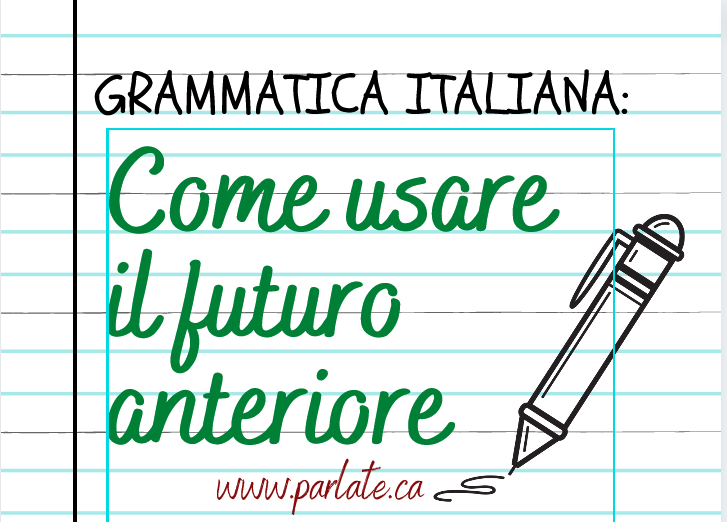(English follows)
Eccoci alle prese con uno dei verbi meno studiati dagli studenti di lingua italiana e meno usati nella lingua parlata: Il futuro anteriore (o futuro composto). Allora perche studiarlo mi chiederai? Tecnicamente il futuro anteriore è un tempo verbale che esprime fatti proiettati nel futuro ma avvenuti prima di altri. In poche parole illustra il rapporto temporale tra due eventi futuri. Non viene comunemente insegnato agli stranieri per la sua apparente complessità. Comunque esiste anche in inglese e concide con il future perfect.
Ma come vedremo negli esempi che seguono, il futuro anteriore ha un ruolo importante. Ha una funzione tanto importante da essere fondamentale nei testi giuridici.
Il futuro anteriore è molto simile nella sua costruzione al passato prossimo, con l’unica differenza che il verbo ausiliare (essere o avere) usa il futuro semplice.
Tabella del futuro anteriore di verbi regolari in:
-are, -ere, -ire
| Parl-are | Ricev-ere | Part-ire | |
|---|---|---|---|
| Io | Avrò parl-ato | Avrò ricev-uto | Sarò part-ito/a |
| Tu | Avrai parl-ato | Avrai ricev-uto | Sarai part-ito/a |
| Lui/Lei | Avrà parl-ato | Avrà ricev-uto | Sarà part-ito/a |
| Noi | Avremo parl-ato | Avremo ricev-uto | Saremo part-iti/e |
| Voi | Avrai parl-ato | Avrete ricev-uto | Sarete part-iti/e |
| Loro | Avranno parl-ato | Avranno ricev-uto | Saranno part-iti/e |
Quando si usa l’ausiliare “essere” ricordati di concordare il futuro anteriore con il soggetto:
Maschile singolare: Fra un mese, sarò partito per l’Italia.
Femminile singolare: Fra un mese, sarò partita per l’Italia.
Maschile plurale: Fra un mese, saremo partiti per l’Italia.
Femminile plurale: Fra un mese, saremo partite per l’Italia.
Misto maschile/femminile plurale: Fra un mese, saremo partiti per l’Italia.
Quando si usa il futuro anteriore?
Si usa per parlare di un’azione futura che si è gia conclusa prima di un’altra azione futura:
Domani a mezzogiorno saremo già arrivati al mare.
– Tomorrow at noon we will already have arrived by the seaside.
Si usa nei casi in cui si esprime ipotesi o dubbio sul passato:
Non è venuta al lavoro ieri, sarà stata malata.
– She didn’t come to work yesterday, she must have been sick.
Nella lingua parlata il futuro anteriore viene spesso sostituito con il futuro semplice e il passato prossimo:
(1) Quando arriveranno gli ospiti, inizieremo a pranzare.
Invece di:
Quando saranno arrivati gli ospiti, inizieremo a pranzare.
– When the guests will have arrived, we’ll start eating lunch.
(2) Quando avete finito di usare il passapomodoro, ce lo prestate?
Invece di:
Quando avrete finito di usare il passapomodoro, ce lo presterete?
– When you will have finished using the tomato press, will you lend it to us?
Due alternative al futuro anteriore usate nel linguaggio parlato:
1. dopo + participio passato
Dopo che avrò studiato guarderò un film. = Dopo aver studiato guarderò un film.
– After having studied, I’ll watch a film
2. forse + passato prossimo
Maria non mi ha chiamato, si sarà dimenticata. = Maria non mi ha chiamato, forse si è dimenticata.
– Maria didn’t call me, maybe she forgot.
Tocca a te! Prova a scrivere delle frasi nei commenti usando il futuro anteriore!
English version:
Here we are tackling one of the verbs less studied by students of the Italian language and less used in the spoken language: Il futuro anteriore (o futuro composto). So why study it you might ask me? Technically, the il futuro anteriore is a verbal tense that expresses facts projected into the future but that occurred before others. In a nutshell, it illustrates the temporal relationship between two future events. It’s not commonly taught to foreigners due to its apparent complexity. However, it also exists in English and coincides with the future perfect.
But as we will see in the examples that follow, the futuro anteriore plays an important role. It has such an important function that it’s fundamental in legal texts.
The futuro anteriore is very similar in its construction to the passaro prossimo/present perfect, with the only difference that the auxiliary verb (essere/to be or avere/to have) uses the simple future.
Futuro anteriore, chart of regular verbs in:
-are, -ere, -ire
| Parl-are | Ricev-ere | Part-ire | |
|---|---|---|---|
| Io | Avrò parl-ato | Avrò ricev-uto | Sarò part-ito/a |
| Tu | Avrai parl-ato | Avrai ricev-uto | Sarai part-ito/a |
| Lui/Lei | Avrà parl-ato | Avrà ricev-uto | Sarà part-ito/a |
| Noi | Avremo parl-ato | Avremo ricev-uto | Saremo part-iti/e |
| Voi | Avrai parl-ato | Avrete ricev-uto | Sarete part-iti/e |
| Loro | Avranno parl-ato | Avranno ricev-uto | Saranno part-iti/e |
When using the auxiliary “essere/to be” remember that il futuro anteriore agrees with the subject:
Masculine singular: Fra un mese, sarò partito per l’Italia.
Feminine singular : Fra un mese, sarò partita per l’Italia.
Masculine plural: Fra un mese, saremo partiti per l’Italia.
Feminine plural: Fra un mese, saremo partite per l’Italia.
Mixed masculine/feminine plural: Fra un mese, saremo partiti per l’Italia.
When is il futuro anteriore used?
It is used to talk about a future action that has already ended before another future action:
Domani a mezzogiorno saremo già arrivati al mare.
– Tomorrow at noon we wil already have arrived by the seaside.
It is used in cases where hypotheses or doubts about the past are expressed:
Non è venuta al lavoro ieri, sarà stata malata.
– She didn’t come to work yesterday, she must have been sick.
In spoken language, il futuro anteriore is often replaced with the futuro semplice/simple future and the passato prossimo:
(1) Quando arriveranno gli ospiti, inizieremo a pranzare.
Instead of:
Quando saranno arrivati gli ospiti, inizieremo a pranzare.
– When the guests will have arrived, we’ll start eating lunch.
(2) Quando avete finito di usare il passapomodoro, ce lo prestate?
Invece di:
Quando avrete finito di usare il passapomodoro, ce lo presterete?
– When you will have finished using the tomato press, will you lend it to us?
Two alternatives to il futuro anteriore used in spoken language:
1. dopo + participio passato
Dopo che avrò studiato guarderò un film. = Dopo aver studiato guarderò un film.
– After having studied, I’ll watch a film
2. forse + passato prossimo
Maria non mi ha chiamato, si sarà dimenticata. = Maria non mi ha chiamato, forse si è dimenticata.
– Maria didn’t call me, maybe she forgot.
It’s your turn! Try writing sentences in the comments using il futuro anteriore!
- I massacri delle foibe – Il Giorno del Ricordo

- Estate di San Martino- leggenda e tradizioni

- Michela Murgia: tenace scrittrice e attivista italiana

- I Vini italiani |Storia e Cultura

- Italian Formal and Informal pronouns

- Italian vs. Anglicisms and Gadda -Do we need a law to protect Italian?

- 26 Italian women who made history

- Introduction to the Samnites | I Sanniti – introduzione

- The career of the movie icon, Sophia Loren



Entro lunedì avrò visto il film.
Giusto!